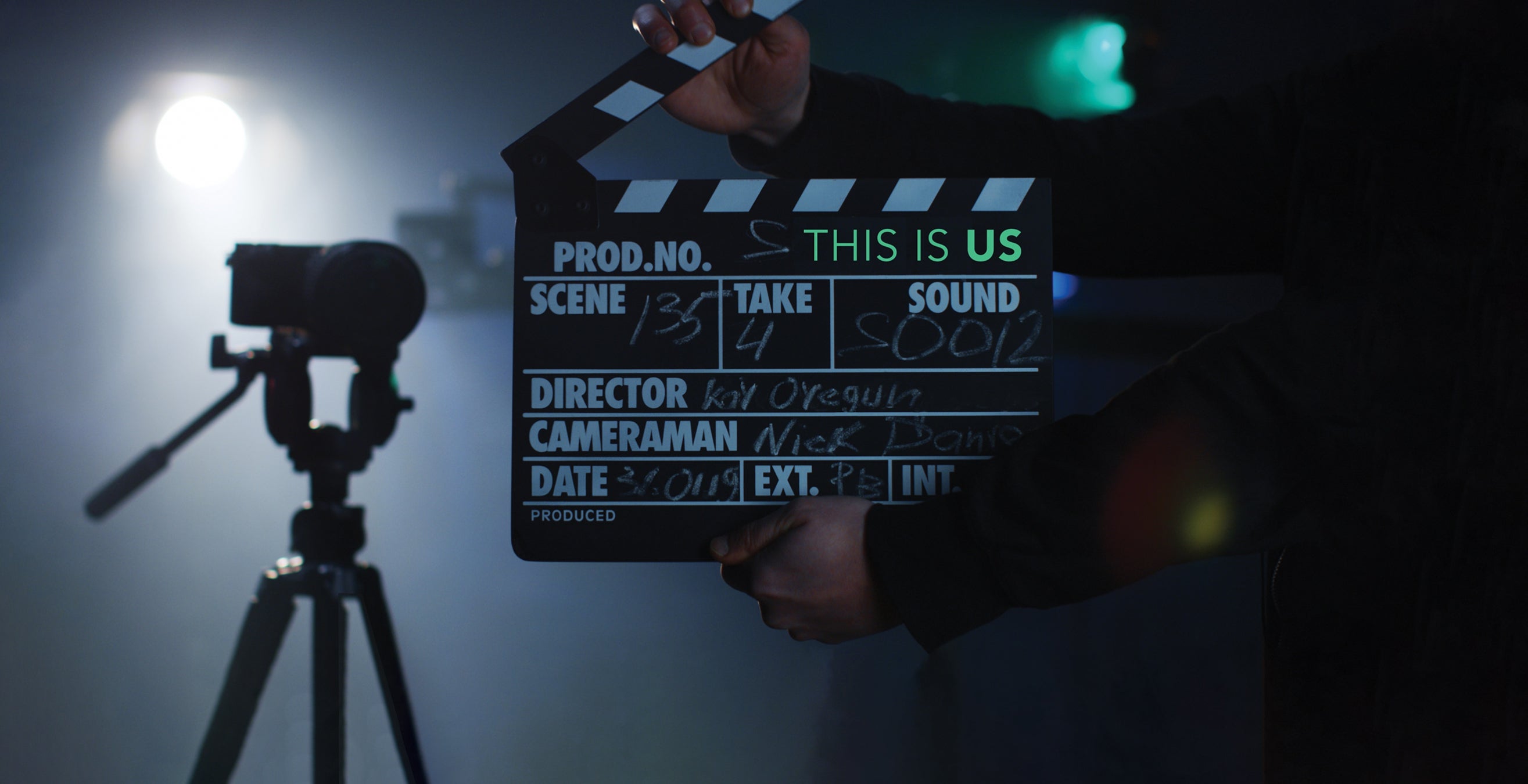Kay Oyegun arrives at Paramount Studios a few minutes before 10 a.m. Earlier, at home, she finished her morning devotionals—prayer is a key part of her faith and routine. But now she’s preparing for another form of devotion.
She settles into a conference room with 12 other writers and creatives. All of them huddle around a long, white conference table, many holding a cup of coffee. Ideally, the caffeine will help jolt their imaginations—because what’s about to transpire in this room will touch millions upon millions of lives.
The eclectic group will be doing what they call “breaking an episode,” which is developing the specific, character-driven, emotional details that give life and soul to the family members of the NBC drama series “This Is Us,” one of television’s most critically acclaimed programs.
“This Is Us” tracks the fictitious lives of Jack and Rebecca’s three children who were born and raised in Pittsburgh. It premiered in 2016; and, since then, the series and its actors have garnered many of the industry’s most coveted accolades, including Emmy, Golden Globe, Critics Choice, People’s Choice, Screen Actors Guild and Writers Guild of America awards.
Oyegun (A&S ’10, BUS ’10) has been there from the beginning—starting as a staff writer and rising to her current role as co-executive producer and writer. But she isn’t stopping to bask in her success just yet. In fact, she’s working harder than ever.
Oyegun, who’s written for the Oprah Winfrey Network’s popular family drama “Queen Sugar,” was recently selected for NBCUniversal’s Female Forward and Emerging Director programs. She’s using her talents to adapt two best-selling novels to screen: “Children of Blood and Bone” for Lucasfilm, Fox and Disney and “On the Come Up” for Paramount. And she recently wrote and sold two screenplays—one to HBO Max and the other to Paramount.
As her accomplishments mount, her voice, and the life experiences that formed it, are finding new significance in the media landscape.
Oyegun’s own story began far from Hollywood and far from Pittsburgh. Her early roots were laid in Lagos and other parts of Nigeria. That’s where she would often retreat into the quiet of her room as a way to escape her brothers and the world’s noise. She surrounded herself with dolls and stuffed animals and commanded them to come alive.
Barbie became a talk show host, chatting to an audience of plush characters who were seemingly so enthralled that they never blinked. Barbie may have been speaking, but it was Oyegun’s voice, her stories, that filled the room. When Oyegun wasn’t having Barbie host a show, she was parked in front of the television, absorbing her favorite show, “Fresh Prince of Bel-Air,” learning parts of the American story.
At the same time, Oyegun was also pounding out what she calls “weird, terrible” stories onto a floppy disk, dreaming of becoming a novelist. She was drawn into the magic of stories, their open possibilities.
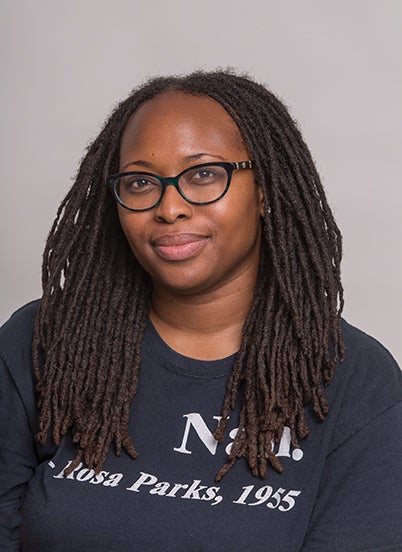 When she was 10, she took her dreams with her to the United States when her mother moved the family to North Philadelphia. As the family transitioned into a new culture, some days were tougher than others. Oyegun remembers walking miles to the store to save on bus fare and carrying grocery bags for so long they felt as if they were cutting into her fingers. At times, the family relied on relatives and friends for shelter.
When she was 10, she took her dreams with her to the United States when her mother moved the family to North Philadelphia. As the family transitioned into a new culture, some days were tougher than others. Oyegun remembers walking miles to the store to save on bus fare and carrying grocery bags for so long they felt as if they were cutting into her fingers. At times, the family relied on relatives and friends for shelter.
But it wasn’t long before Oyegun was accepted to the Milton Hershey School, a prestigious boarding school for students from low-income families. On its leafy, sprawling campus, about 90 miles from North Philadelphia, the shy eighth-grader reinvented herself, becoming independent, inspired and driven.
Oyegun befriended a spirited drama teacher, Janice Stewart, who introduced her to Tennessee Williams, Shakespeare and James Baldwin. They spent hours talking about “Hamlet,” “A Midsummer Night’s Dream” and classic story structure. Under her instructor’s tutelage, the young woman created, performed and transformed. She was Calpurnia in “To Kill a Mockingbird.” She was Ishmael in “Moby Dick.” She was a new person reaching for new heights.
Before Hershey, Oyegun says, so much of her childhood in America “had been about survival and that the idea of taking a break to consume art and literature was something she never imagined.” But Stewart gave Oyegun a chance to “live with” and “touch American culture.” She gained a level of confidence and self-possession that made her feel less like an outsider and more like a citizen of her new home.
When she was 18, a confident Oyegun, who graduated second in her class at the Milton Hershey School, charged into Pitt. Although high school had given her a deepened appreciation for the arts and a fondness for storytelling, she now set her sights on a career in medicine, influenced, in part, by family expectations.
She leaped into a load of chemistry and biology classes. Yet, she felt disconnected from the lessons, like she was “learning an extraterrestrial language.” The science classes did give her a chance to bond with a group of determined and aspirational African and Caribbean female students, however. They would sit in the front of their classes, study together and spend a ton of time in the library.
These classmates recall Oyegun as the creative bookworm who excelled at trivia, knew all of the actresses, could recite lines from movies, liked concerts and poetry slams, and possessed a wicked sarcasm. Early on, they saw the signs of Oyegun’s brilliance with arts and writing.
So, when Oyegun decided to follow her heart and leave her medical studies, it surprised no one that she pivoted to journalism and business, along with film studies and digital media.
“I loved Pitt,” she says. It was a place that allowed her to move forward as “a person who loves words.”
She served as a writer for The Pitt News, where she was drawn to human-interest stories that captured struggles and triumphs. In her classes, particularly those in Africana studies, she explored the complexities of the human experience and how so much of it transcends differences of geography, class or gender. Those ideas, she says, broadened her sense of what makes a story universal and eventually helped to shape her career, putting her firmly back in touch with that little girl who dreamed of writing.
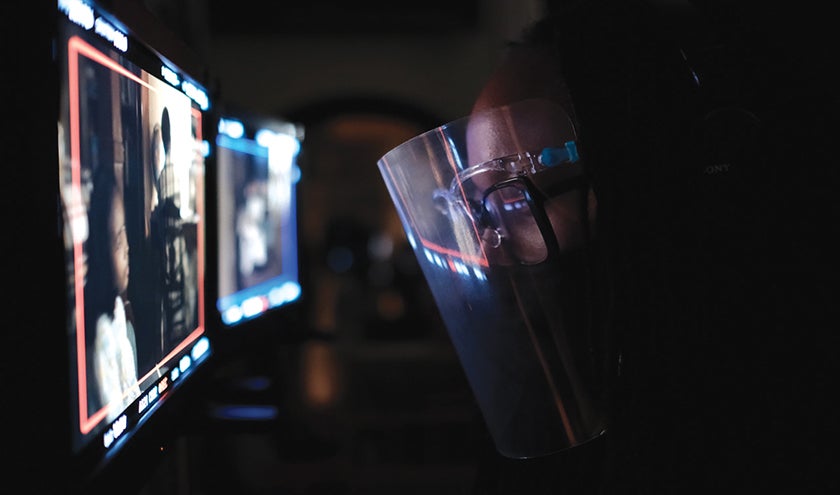 Oyegun’s Pitt studies helped her land an internship with CBS News in New York in 2008. In the heart of where news happens, she saw the excitement in the control room generated by that year’s presidential election. As the votes were counted, she said to herself: “This is what I want. Everything about this is what I want to do forever.”
Oyegun’s Pitt studies helped her land an internship with CBS News in New York in 2008. In the heart of where news happens, she saw the excitement in the control room generated by that year’s presidential election. As the votes were counted, she said to herself: “This is what I want. Everything about this is what I want to do forever.”
She seized on that goal. Right after graduation, she moved to New York, sharing an apartment with a bunch of strangers she met on Craigslist and working at the headquarters of “NBC Nightly News.” She also did stints at NBC’s “Today” show and “Weekend Today.”
It was a young storyteller’s joy. She was engaged in story development from beginning to end, learning to write, shoot video and assist in editing. Just like at Pitt, she was drawn to human stories. She did reports on the rescued Chilean miners, the Ground Zero mosque, the nation’s first hand transplant—even Octomom.
“The news, the news world and the newsroom, was something that fed me in a way that I absolutely adored,” she says. The work strengthened her ability to focus on characters and build storylines that connect with the human heart.
Yet, she yearned to use more of her voice, her creativity, to share more of all she had felt and experienced. So, as she’s done for much of her life, on a leap of faith, she left New York and, in 2013, earned a graduate degree at the University of Southern California’s Peter Stark Producing Program, formalizing her education in film and television. There in Los Angeles, in what she describes as “a town full of optimism and heartbreak,” Oyegun continued to push herself creatively.
In 2016, she earned a job writing for “This Is Us.”
Now, when she sits down in the Paramount Studios writers’ room, all of who she is, where she’s from, what she’s done, comes to the table.
Many times, her experiences and perspectives on race and culture and dimensions of faith and spirituality show up in the character Randall, played by the actor Sterling K. Brown, one of the show’s protagonists. He’s a Black man who was adopted by the Pearsons, a white couple, the day he was born. Many of the ideas that Oyegun has brought to the table show Randall’s emotional core: his excitement about the possibility of enrolling at the historically Black college Howard University; his decision, as an adult, to move his family from the suburbs to Philadelphia; his struggle with mental health and seeking a therapist.
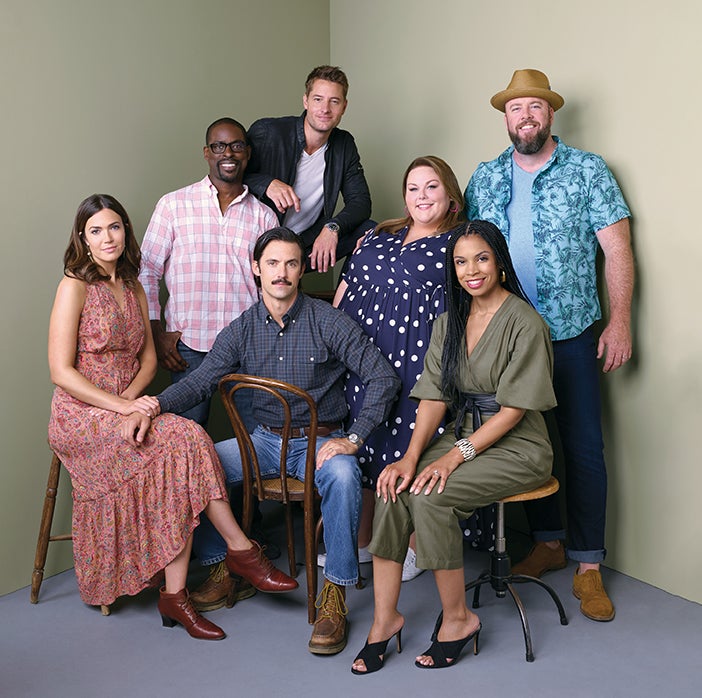 For the show’s fall 2020 season opener, Oyegun helped to craft a poignant, sorrowful storyline where Randall reflects on the country’s long history of police violence against Black men.
For the show’s fall 2020 season opener, Oyegun helped to craft a poignant, sorrowful storyline where Randall reflects on the country’s long history of police violence against Black men.
In the scene, Randall is distraught over the killing of George Floyd. While sitting on the front steps of his home, the adult Randall, speaking with his daughter’s boyfriend, recalls an event that happened in Pittsburgh in 1995—the police killing of Black businessman Jonny Gammage. Randall was a young teenager then and remembers the silence in the Pearson home surrounding the incident.
“He was driving home one night in this fancy car,” Randall says in the episode. “Cops tried to pull him over for an expired registration. He ended up getting pinned down by five of them for resisting arrest. He died right there.”
The fateful night became a flashpoint for Black people in Pittsburgh and beyond and resonated for Oyegun, who was then living in Philadelphia. She—alongside writer Jake Schnesel and series creator Dan Fogelman—are credited with developing the two-hour, season-four premiere, which featured Randall’s reckoning with race. The week it premiered, the episode garnered 10.56 million viewers, bested by only three NFL contests and the deciding game of the World Series in the overall TV rankings.
“Jonny’s life and story have been on my heart for years,” she says. And now his story is on the heart of more than 10 million viewers.
Oyegun also has personal imprints on episodes that explore class distinctions in the Black community, the immigrant experience and what it feels to be a young girl.
She draws from the story of her mother, who once worked as an administrator with a Nigerian petroleum corporation and had to start over with a low-wage position at a gas station upon moving to the United States. Her family eventually settled in; her mom is now a nurse. But Oyegun hasn’t forgotten having to navigate being both Nigerian and American, when even a native accent can cause isolation.
Although life has given her a new perspective, as an adolescent in a new country, she once felt that “the minute you open your mouth, everyone thinks you’re either dumb or confused, and you’re not any of those things,” she says. “It was very alienating.”
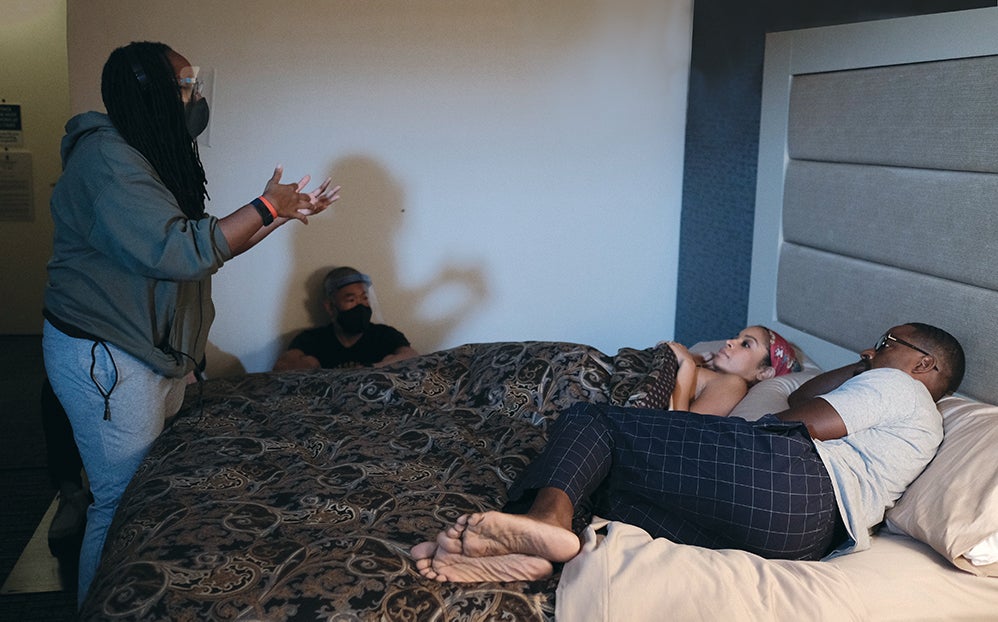 Helping to tell the stories of Black life in America, says Oyegun, is a mission. “I want Black people to see the show and feel affirmed—to feel seen, to feel connected to the material.” She can do this with “This Is Us,” she says, because the writers’ table is a safe space. Oyegun doesn’t feel “othered” in the openness there and acknowledges that while her story pitches get filtered through her lens on life—as a Black woman, a Nigerian woman, a Christian woman—she’s also able to link to what she calls the broader “human stories that are connecting people together.”
Helping to tell the stories of Black life in America, says Oyegun, is a mission. “I want Black people to see the show and feel affirmed—to feel seen, to feel connected to the material.” She can do this with “This Is Us,” she says, because the writers’ table is a safe space. Oyegun doesn’t feel “othered” in the openness there and acknowledges that while her story pitches get filtered through her lens on life—as a Black woman, a Nigerian woman, a Christian woman—she’s also able to link to what she calls the broader “human stories that are connecting people together.”
Similarly, she makes contributions beyond the show’s African American characters, too; but, she points out, “As writers, as producers, we all hold a space in the show and there are things that are particular on our hearts that we want to share and engage with, and also be protective over.”
Oyegun takes all that and more to the conference table at Paramount Studios as she meets with a diverse collage of writers. In the room are two massive whiteboards. Each is jumbled with a display of differently colored note cards, which are assigned to each “This Is Us” character, tracking the stories and timelines that reach back to 1940.
For sometimes hours a day, Oyegun sits with the other writers as they toss out a thousand little pieces of themselves, using the fragments to assemble the whole, complex stories of the Pearsons’ lives.
“As we write,” Oyegun says, “we cry.”
But it’s not all tears. As opportunities expand for Oyegun, she’s scripting comedy, fantasy thrillers, a biography and book adaptations. Hollywood is hearing her but, she says, she won’t be limited by her own experiences. A good writer hunts down the universal.
“For the longest time, I always looked for a point of view that was similar to mine. I was always drawn to people and characters who are struggling to do the right thing, who are struggling to find the best version of themselves. I’m always drawn to characters and stories where people aren’t quite getting it right, but they desperately want to. Those are the things that I always gravitated toward. Those are the places where I can still see myself in a lot of ways.”
This is Kay Oyegun—and it’s just one of the stories she’s using her voice to tell.
This article appears in the Spring 2021 edition of Pitt Magazine.

